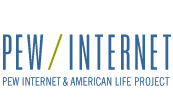 I have been a subscriber and an avid reader of reports from the Pew Internet and American Life Project. Here’s a snippet from their web site that will give you an idea of who they are and what they do. “The Pew Research Center, a nonprofit “fact tank” provides information on the issues, attitudes, and trends shaping America and the world… The Project is nonpartisan and takes no position on policy issues. Support for the project is provided by The Pew Charitable Trusts.”
I have been a subscriber and an avid reader of reports from the Pew Internet and American Life Project. Here’s a snippet from their web site that will give you an idea of who they are and what they do. “The Pew Research Center, a nonprofit “fact tank” provides information on the issues, attitudes, and trends shaping America and the world… The Project is nonpartisan and takes no position on policy issues. Support for the project is provided by The Pew Charitable Trusts.”
Pew reports are fascinating glimpse into our society. They cover so many topics. I have been paying special attention to their reports on religion and GLBT related issues. The reports are very impartial and do a nice job of getting the pulse of the country distilled into readable reports.
This week I received an email notifying me that they had just issued The Internet and the 2008 Election report. It was quite telling. I think it parallels many of their prior reports that demonstrate that Americans are increasingly using the Internet more in their daily lives. The growth in use from their 2004 election report is staggering. I recommend that you go out to their website and read this report. It only takes 10-15 minutes. They also provide 1-2 page summaries for those who are not interested in the fine details. Here are some interesting factoids that I extracted from this report.
- Fully 46% of all Americans have used the internet to get news about the campaigns, share their views, and mobilize others.
- 10% of Americans use email to contribute to the political debate with a similar frequency.
- In May and June of 2004, about 8% of adults were using the internet on a typical day to stay in touch with political developments. In April and May of this year, 17% of adults are getting political news online on a typical day.
- Two new internet activities have stormed the political stage: 35% of Americans have watched online videos related to the campaign, and 10% have used social networking sites to engage in political activity.
- Young voters tilt toward Obama specifically and toward the Democrats generally, and that gives the Democrats some online advantages.
- In a head-to-head match up with internet users who support Republican McCain, Obama’s backers are more likely to get political news and information online (65% vs. 56%).
- One in three internet users has a profile on a social networking site such as Facebook or MySpace, and 40% of these (representing 10% of all adults) have used these sites to engage in political activity of some kind.
